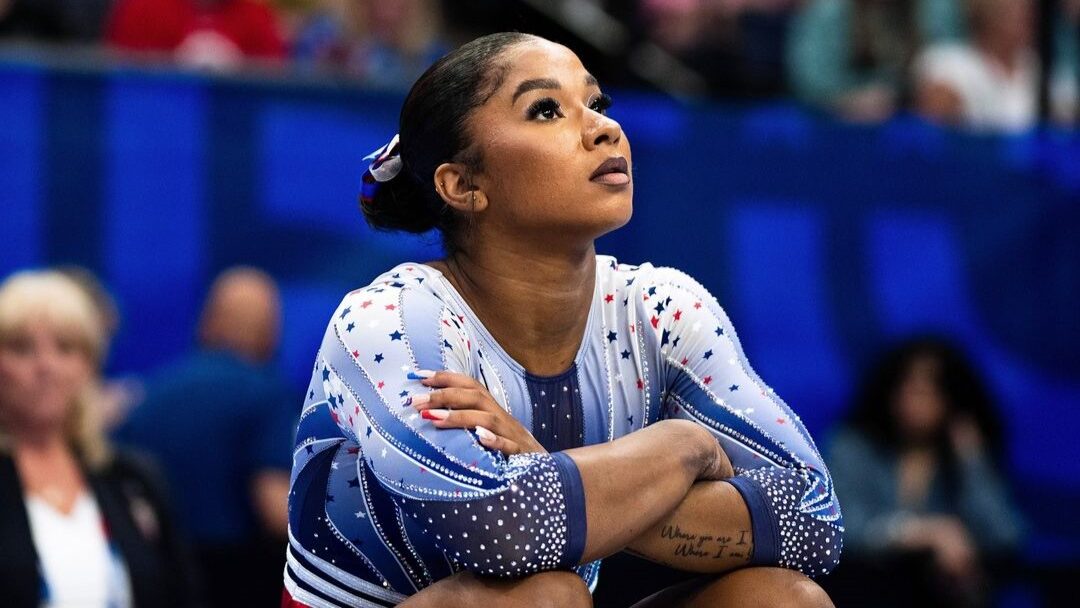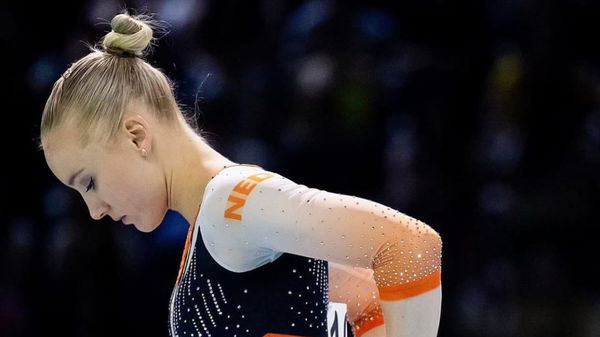

23 days have already passed since Jordan Chiles accepted her fate at the Paris Olympics. She had the last laugh after the revised score placed her behind Rebeca Andrade and ‘big sister’ Simone Biles. The 0.1 increase in Chiles’ score meant Ana Barbosu had to leave the rank for the American gymnast. When the final revised score was updated on the LED screen in Bercy Arena, the Romanian gymnast broke into tears, losing the laurel. A week later, Jordan underwent a similar emotion when the Court of Arbitration for Sports reinstated Ana in her rank, barring the former from her title. The gymnastics world couldn’t believe the turn of events. But a Dutch gymnast had already gone through a similar experience a few days before that.
Watch What’s Trending Now!
The women’s all-around semi-final event at the Paris Olympics had almost a similar situation. A fraction of points, error in judging, and lack of awareness of the rules—the combined effect of all these three factors demolished a gymnast’s dream.
ADVERTISEMENT
The agony of bearing the consequences of others’ fault
In the women’s all-around semifinal, Lieke Wevers was penalized 0.3 after her routine for stepping out of bounds, which prevented her from advancing to the final. She was uncertain about the judging process, as a deduction of just 0.1 would have placed her in 10th position, qualifying her for the final. Determined to find answers, Wevers began to investigate the reason behind her deduction. What she discovered, however, was even more shocking. In the Spotify podcast, Accountability In Gymnastics: Part 1, she revealed that she had come into contact with a judge from that event later and afterward: “She confirmed already quickly that she thought this is not correct.” Lieke Wevers didn’t pause, explaining her surprising experience.

ADVERTISEMENT
The concerned judge informed the gymnast that one of her feet was out, which could justify a lower score. However, the 32-year-old sought confirmation from Donatella Sacchi, an official well-versed in the rules. Sacchi, the president of the gymnastics jury board at the Tokyo Olympics, ultimately confirmed what Lieke suspected—the deduction was incorrect. But at that moment, Lieke uncovered another truth.
ADVERTISEMENT
Her coaches had the option to challenge the neutral deductions. But they didn’t. “We didn’t know the rules, I just didn’t know and the coaches also didn’t know and that’s the fault of our staff,” she resolutely argued. But in the end, only she was at the receiving end: “The consequences are on me.” In a heavy voice, she continued, “I always take a look at myself for what could have done better. You know, I have not known and I blame myself, but even it’s not my responsibility.” That feeling of losing everything because of others’ fault made her stand in a similar position to Jordan Chiles.
Top Stories
Greg Biffle’s $4M Worth Prized Possession Still Without a Buyer Leaves NASCAR Fans Heartbroken

LIV Golf Braces for Another Possible Exit in Wake of Brooks Koepka Departure

Sean Payton Announces Retirement Plans as Broncos HC Demands Improvement From Bo Nix & Co. Before Playoffs

Biff Poggi All But Confirms Bryce Underwood’s Michigan Future After Announcing His Own Departure

Roger Federer Draws Criticism from Swiss Government Chief for Tourism Boom in Country

Amanda Balionis Confirms New Relationship Ending Months of Rumors

Jordan Chiles faces the results of mistakes made by unknown entities
After Jordan Chiles’ event, her coach, Cecile Landi, challenged the judges at Bercy Arena, arguing about a missing point from her split leap. However, when the Romanian Gymnastics Federation appealed the ruling to the Court of Arbitration for Sport (CAS), the board overturned the judges’ decision from the vault final, declaring that Cecile’s challenge violated the existing rules.
ADVERTISEMENT
Yet, USA Gymnastics couldn’t remain a mere spectator. After the CAS’ final verdict, the authority submitted video evidence. The evidence shows that Cecile had submitted her inquiry to the table “47 seconds after the score was posted, followed by a second statement 55 seconds after the score was originally posted.” The original rules permit the inquiry to be placed under one minute. Still, the CAS couldn’t alter its decision, as “their rules do not allow for an arbitral award to be reconsidered even when conclusive new evidence is presented.” So, the question arises about whose fault kept the sword on Jordan Chiles. Meanwhile, the global gymnastics body FIG has taken a confusing stand on the entire situation.

Reuters
Paris 2024 Olympics – Artistic Gymnastics – Women’s Team Final – Bercy Arena, Paris, France – July 30, 2024. Jordan Chiles of United States during the Women’s Team Final. REUTERS/Amanda Perobelli
Last week, Morinari Watanabe, the president of FIG, made his final statement on Jordan Chiles’ fiasco. He stated, “This tragedy must never happen again. Since I became FIG president, I have been promoting the use of technology in judging.” But that left him deep in the hot water as Jordan’s mother, Gina, posted, “This statement is a tragedy. ChatGPT would have done you wonders here 🤦🏽♀️.” As of now, there’s still no sign of stopping the debate, let alone finding a solution. Now, Lieke Wevers has proved the existence of dark reality in gymnastics.
ADVERTISEMENT
Before you go, don’t forget to check out what one of America’s most talented volleyball players, Maddisen Skinner’s coach, reveals about his star student! EssentiallySports brings you this exclusive scoop in this week’s Think Tank episode.
ADVERTISEMENT
ADVERTISEMENT
ADVERTISEMENT
ADVERTISEMENT

